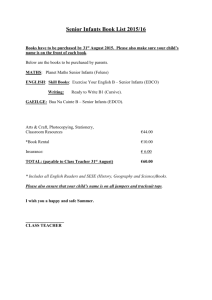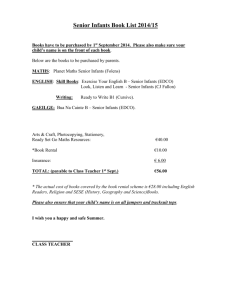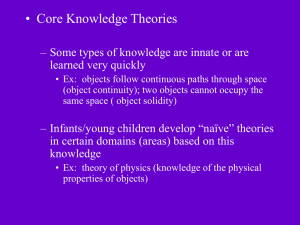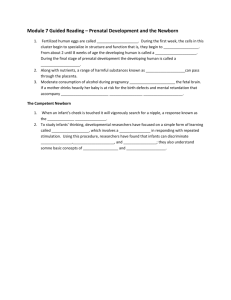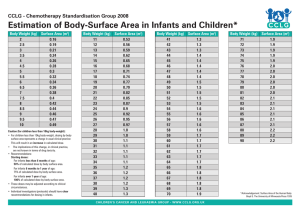Immune Correlates of Risk of TB Disease in BCG Vaccinated infants
advertisement
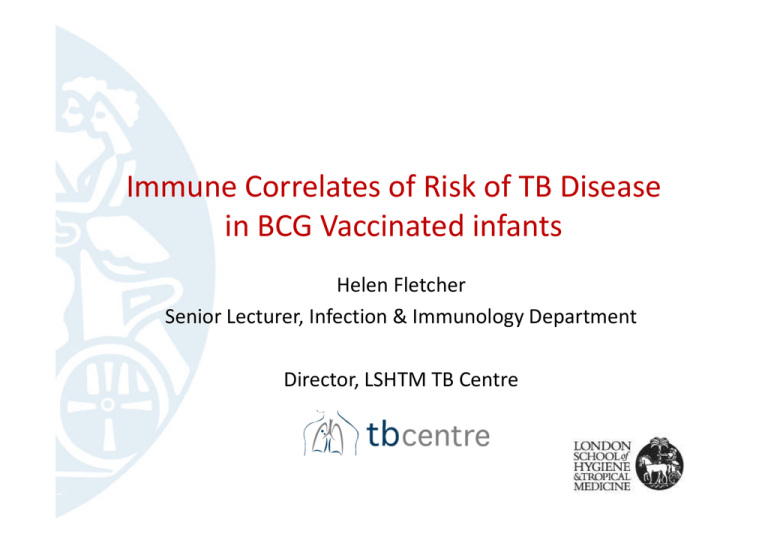
Immune Correlates of Risk of TB Disease in BCG Vaccinated infants Helen Fletcher Senior Lecturer, Infection & Immunology Department Director, LSHTM TB Centre BCG efficacy by age and previous exposure to mycobacteria infant • • • First given in 1921 0-80% efficacy Reasons for variability? – Variations in BCG strain – Geographical location – exposure to mycobacteria Skin test negative children Skin test positive children X Skin test negative adult X Skin test positive adult X Punam Mangtani et al. Clin Infect Dis. 2014;58:470-480 Transcriptional profiling identified 2 major immune response clusters in BCG vaccinated infants from South Africa Cluster 1 Cluster 2 CD4+ T Cell Cytokine (%) p = 0.0323 0.0112 0.0028 0.0085 1.5 1.0 0.5 Fletcher, Nemes, Filali submitted TN IF N Fα γ+ + IL 2+ TN Fα + + IL 2 IF N γ+ 0.0 Monocyte to T cell ratio AMPK Oxidative phosphorylation 0.0214 30 CD14+monocytes(%of CD45+cells) 60 40 20 20 10 C a se s C a se s C T R C a se s C a se s 0 M1 • Translation M1 Differences in CD14+ and CD3+ frequency between clusters • Differences in monocyte phenotype • Differences in the effectiveness of a booster TB Vaccine? Treg Fletcher, Nemes, Filali submitted 0.1068 0.0224 0 Cluster 2 cases Cluster 1 cases 0.0365 80 CD3+Tcells(%of CD45+cells) M2 0.6552 0.0412 C T R Platelets Birth BCG 16-24 weeks MVA85A or placebo ADAPTIVE IMMUNITY PBMC stored from ~2700 infants Before immunisation and +28 days • 71 infants developed TB in next 3 years (cases) • 213 matched controls (controls) 1-3 years Infants separate into distinct clusters – differences in monocyte genes SFC/million PBMC 1100 600 100 50 E. B E. CG B 1 C E. G PP 2 E. D P 1 E. PD 10 2 E. 34 10 1 E. 34 E 2 E. BV E 1 E. BV C 2 E. MV C 1 M E. V FL 2 E. U FL 1 U 2 0 Frequency of live cells 30 p=0.007 20 p=0.024 10 MVA85A immunogenicity and efficacy by cluster? Muller, Fletcher in preparation Cluster 1 Cluster 2 N .M O C C .M O N 1 N I.M O I.M O N 1 0 T-cell activation and BCG IFN-g ELISPOT are immune correlates in BCG-vaccinated infants HLA-DR+ CD4+ T-cells BCG-IFN- ELISPOT 400 OR 1.828, p = 0.002 10 OR 0.502, p = 0.013 300 SFC/million PBMC log frequency of live cells 100 200 150 100 50 1 control control case case 0 control case Result significant if Conditional Logistic Regression P<0.05 and FDR<2 Shaded bar indicates medium third of immune response level Measured in healthy infants up to 3 years before disease develops Fletcher HA et al Nature Communications, In Press CD4 T cell activation also associated with risk of disease in adolescents progressor control Time to TB diagnosis Any OR 95% CI P value 1.387 1.068, 1.801 0.014 < 18 months 1.402 1.067, 1.843 0.015 < 12 months 1.537 1.106, 2.135 0.01 s < 6 months 1.501 1.047, 2.152 0.027 Fletcher et at Nature Communications in press; Zak et al Lancet in press Also Type I IFN associated transcriptomic signature Type 1 IFN transcriptomic signature associated with risk of disease 1500 1000 SFC/million PBMC 500 Strong responses to CMV in ~25% of infants 100 80 60 40 20 se ca FL U V M tr ca se e C EB V cn U FL ca s l l cn V C M EB V cn tr tr l 0 Controls Cases CMV- 152 44 CMV+ 33 15 fisher one sided p = 0.138 Muller J et al, unpublished data Summary • T cell activation associated with increased risk in infants and adolescents • Type I Interferon signalling associated with increased risk in infants and adolescents • CMV associated with T-cell activation • The challenge for TB vaccines is the co-factors impacting host immune response BCG efficacy good Mangtani et al Pre exposure vaccine Environmental exposure/LTBI/viral infection/T cell activation BCG efficacy poor Mangtani et al Helen McShane University of Oxford SATVI Elisa Nemes Michele Tameris Mark Hatherill Tom Scriba Greg Hussey Adam Penn-Nicholson Hassan Mahomed Willem Hanekom Rafick-Pierre Sekaly Ali Filali AERAS Bernard Landry Peggy Snowden Bruce McClain Tom Evans MVA85A Study team All the mothers and babies

